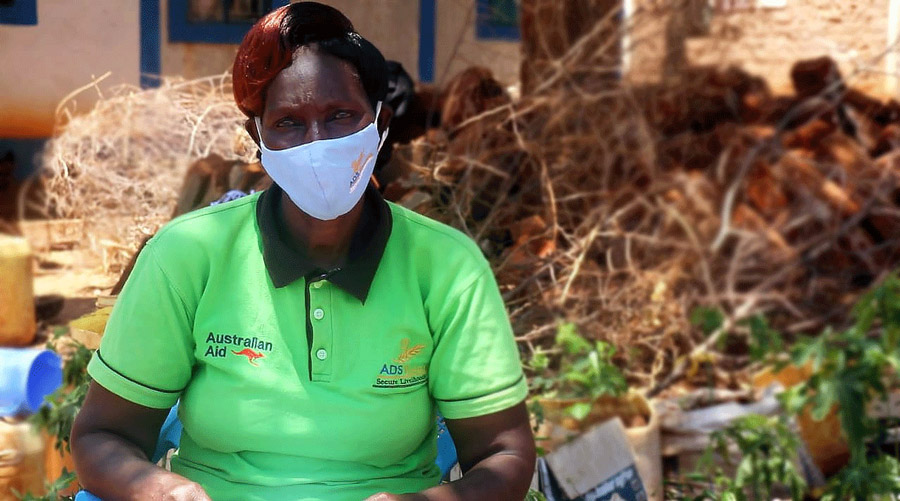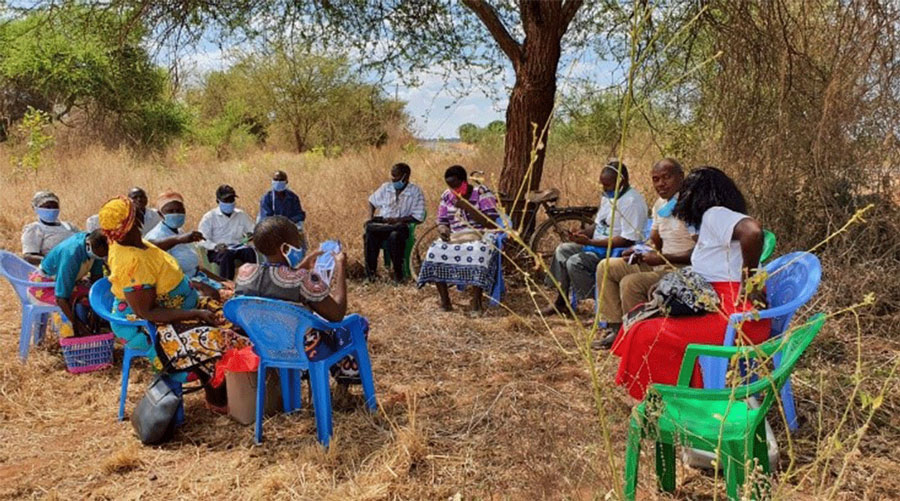Women Leading Women
How ABM works at the grassroots of local communities
Part 1: Kiangini Community-based Organisation
Over the next two months, ABM will publish interviews with the leaders of the two Community-based Organisations (CBOs) whom we (and you) support through ABM’s partner, Anglican Development Services, Eastern (ADSE). We begin with an interview with Josephine Mutava, Chairperson of Kiangini CBO.
Josephine Mutava (pictured) is an impressive leader in anyone’s book. Among her many jobs, she is chair of Kiangini CBO in Kenya’s Makueni County. Her CBO is made up of 17 individual “self-help groups” – a total of 463 farmers, most of them women.
The land of Josephine and her colleague’s farm was gradually becoming drier and drier, and people struggled to harvest the crops they had always planted. Each year they faced the heartbreak of the crops dying through lack of water, as expected rains never came. And in some years, there would be flooding rains which not only destroyed crops, but also other livelihoods and houses. The farmers didn’t have water when they needed it, or the skills they needed to work around the vagaries of the changing climate.
Four years ago, when ADSE was looking for new groups of farmers to work with, they selected Kiangini Location since it was an area high on the poverty index*, with groups willing to participate in the five-year program.
Josephine and her community were keen to work with ADSE, who could help them get the skills and resources they most needed.
ABM: When did you start working with ADSE?
Josephine: Since 2017. We started by identifying the major problems that affect us as a community. These problems especially affected people living with disabilities, the aged, women and children.
We were able to analyse our strengths, weaknesses, threats and opportunities. We then developed a five-year community action plan to guide our operations. We formed a CBO consisting of 17 groups with membership of 78 men and 385 women. We developed a constitution to guide the groups and a Project Management Committee (PMC) to implement our projects and other group operations.
ABM: How do you work with ADSE?
Josephine: The Program Management Committee (PMC) has monthly planning and reporting meetings. It’s at these meetings we decide on any cost-sharing with ADSE for any upcoming trainings. The CBO provides the meeting venue and ADSE provides technical experts and refreshments. When building water structures, the community provides local materials and labour and ADSE supplies the hardware. This gives us ownership.
ABM: What have been some of your successes to date?
Josephine: Building the water structures. These have meant that walking distances between home and the water source have reduced from seven to less than two kilometres for most people. Those who live near the water structures have started practising irrigation while those who live farther away have established kitchen gardens using techniques like Zai pits.
ABM: How are you conserving the environment?
Josephine: Since we are trying to conserve our trees here, people can be trained in building energy-saving stoves. This enables us both to reduce our dependence on charcoal, and gives those who build the stoves an income as they build stoves for other households in the community.
We are also getting trained in good agricultural practices and have been given drought-tolerant seeds, which has increased our crop production.
Another thing is that woodlots have been established in schools. Children now have shade to sit under during their break and the vegetation looks good too.
One of our member groups has established a tree nursery, and currently they are selling seedlings.
The income they get will boost their work at the nursery site. It also provides more trees for our community.
ABM: How are people living with disabilities benefiting from this project?
Josephine: Disability is not inability. During the formation of the CBO, the members agreed on how to reach out to those people living with disabilities (PLWD), since they avoid community participation because of stigmatization. ADSE worked with the County Coordinator from the National Council for Persons Living with a Disability (NCPLWD). This led to the formation of Kiangini Support Group for Disabled Persons. We conducted a forum for all the PLWD, where the officer explained all about disability and the need for PLWD to have an identity card. Within two weeks, the identity cards were issued for people to start accessing services from the NCPLWD.
Before ADSE held these meetings, most PLWD were hidden in their houses. A parent would give birth to a disabled child and then hide them from the neighbours. The PLWD would grow up with low self-esteem because disability could be seen as a curse or witchcraft. We thank God that, after ADSE conducted the disability awareness forums, PLWD and the caregivers of the disabled children were able to get access to services.
The Support Group has been trained in basket weaving, as well as value-adding sorghum, wheat and finger millet through baking cakes and cooking chapatis. They sell the products for income, and their health has improved due to eating more nutritious foods.
The PLWDs are now actively involved in the CBO activities. For example, during construction of the water structures since some can’t lift heavy materials, they took on the lighter jobs. For children with disabilities, their guardians represent them. The secretary of our Kiangini Project Management Committee is a PLWD. We intend to continue involving PLWD in all our activities without discrimination. The CBO also plans to support some of the PLWD with goats and other income generation activities, so that they can earn a living like anyone else.
ABM: How are women empowered through the project?
Josephine: Before ADSE came into our area, women were not actively involved in decision-making.
We were never appointed to leadership positions, and during meetings we used to be afraid of talking or giving our ideas. But since ADSE conducted gender training, women have been empowered to hold various leadership positions in the CBO and other groups. For example, I head the Kiangini CBO and am also a member of Makueni County Ward Committee on Development. Because of the training in leadership skills, women have become courageous and give their opinions and ideas in meetings and forums, unlike before.
Through these women’s empowerment approaches, women can now access financial services through Village Saving and Loans Associations (VSLAs) and Mpanzi SACCO which is a credit union set up by ADSE. Women can now support their households without depending on men who often go to Nairobi and reject their families.
ABM: What are your plans for the future?
Josephine: ADSE trained us in how to write grant proposals, so our CBO members can now look for funding opportunities from government agencies and others. Over the four years, we have been able to write several funding proposals. For example, five of our groups wrote proposals to the Makueni County Government Tetheka fund, and four of them were given grants of 100,000 Kenya shillings each (well over $1,000).
Kanini Kaseo self-help group also wrote another proposal to the national government asking for a 100-seater tent. The tent has been a great source of income to the CBO, as the profits are loaned to group members at 3% interest. And last year the Office of Women supported our CBO with a grant of 100,000 shillings which we allocated to all the groups doing Village Savings and Loans.
In future we plan to buy a plot of land so that we can build rental houses as a source of income. Also, some of our members are poultry farmers, and plan to invest in a poultry mixer machine which they will lend to non-members and to members at a subsidized price. This will be a source of income to the CBO. The aims of these profits will be to support the VSLAs and vulnerable groups, to boost their operations and their lending capacity.
We have also learned which government offices to approach and the proper communication channels to follow. A good example is the installation of a piping system to distribute water to households from River Kikuu. This happened because of increased public advocacy.
We appreciate ADSE and her partner, ABM, who have enabled the trainings on various things that have now brought an impact in our lives. And with water being the major problem within the area, ABM, through ADSE, has constructed water structures so that people can now access water without strain.
ABM thanks Josephine and ADSE for this interview.
Next month we will interview Ben Muli Malawa, Chair of Kyumbuke Development CBO.
* Makueni County, which lies in a semi-arid zone, has more than 64% of people living in poverty, according to the Global Multidimensional Poverty Index (MPI). The MPI measures poverty according to criteria that make up standard of living, education level, and health.
ABM acknowledges the support of the Australian Government through the Australian NGO Cooperation Program (ANCP).

Josephine Mutava ©Anglican Development Services, Eastern
